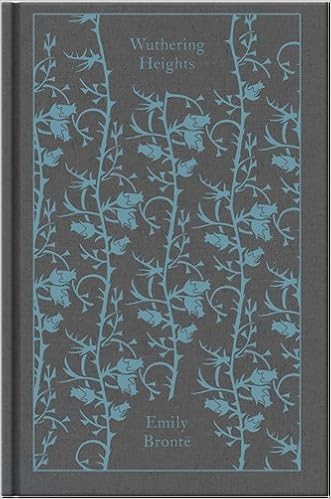Wuthering Heights
by Emily Brontë- Classic, Fiction, Gothic, Romantic
- 16+ for complex themes and vocabulary
- Published September 5th, 1847 by Thomas Cautley Newby
- ★★★★★
Summary
Review"Wuthering Heights is a wild, passionate story of the intense and almost demonic love between Catherine Earnshaw and Heathcliff, a foundling adopted by Catherine's father. After Mr Earnshaw's death, Heathcliff is bullied and humiliated by Catherine's brother Hindley and wrongly believing that his love for Catherine is not reciprocated, leaves Wuthering Heights, only to return years later as a wealthy and polished man. He proceeds to exact a terrible revenge for his former miseries. The action of the story is chaotic and unremittingly violent, but the accomplished handling of a complex structure, the evocative descriptions of the lonely moorland setting and the poetic grandeur of vision combine to make this unique novel a masterpiece of English literature." - Goodreads
So, first of all, this is most likely not an accurate portrayal of the book as I was forced to read it and that is my #1 pet peeve, I hate being forced to read books. However, putting that piece of information aside let's proceed to all the reasons that I absolutely HATED this book.
First of all, the character's in this book are horrible, they are very well developed, maybe even TOO well developed. In a book, although I like evil things, the more twisted the better, I do prefer to have at least one good character. In Wuthering Heights there are none of these. If you can find one I applaud you, but it doesn't matter because you can't. You could argue that Edgar is a decent human being, or that Nelly is always faithful, but I know as well as you do that you would be lying to yourself.
Second of all, is anybody's vocabulary really that big? My mother is an English bachelor, so I have a pretty wide vocabulary, much wider than the average Junior, let alone Freshman. Yet, as I was reading I kept my phone next to me the whole time, and I had as many as four words in one paragraph. So, if you have a really small vocabulary, or you hate being distracted while reading, I do not recommend this book.
Finally, the relationships. The whole book is about love triangles, yes there are multiple. And yet, they somehow end up being almost exactly the same. Now, if you have read this blog before, you most likely know that I have a hatred for romance, I think it is the biggest waste of paper ever created. So reading a book I already didn't want to read for a class AND it being full of romance, I was not a happy camper.
Recommendation
Now, I am not one to discourage people from reading something they're interested in, and there are many people throughout the world that LOVE this book. However, if you are a teen looking for a interesting book, or a light read, I don't recommend this book, unless you have a PhD in English (which I doubt). Now, if you happen to like classics and are always looking for something to expand your vocabulary, GO FOR IT. Don't let anybody stop you. However, this just wasn't my cup of tea and I can't wait until I can go back to reading what I choose. Also, if you do happen to pick up the book and need help translating Joseph's WONDERFUL dialogue (can you sense the sarcasm?) I personally recommend this website, it's a miracle worker.
About the Author
She had unconventional religious beliefs, rarely attending church services and, unlike the other children, never teaching in the Sunday School.
In appearance, she was lithesome and graceful, the tallest of the Brontë children (her coffin measured five feet seven inches – 1.7 meters) but ate sparingly and would starve herself when unhappy or unable to get her own way. As her literary works suggest, she was highly intelligent, teaching herself German while working in the kitchen (her favorite place outside of the moors) and playing the piano well enough to teach it in Brussels. Her stubbornness lasted to the end where she refused to see a doctor or rest while she was dying of tuberculosis." - Wuthering Heights Official Website (The above has been edited to fit American spellings)

No comments:
Post a Comment